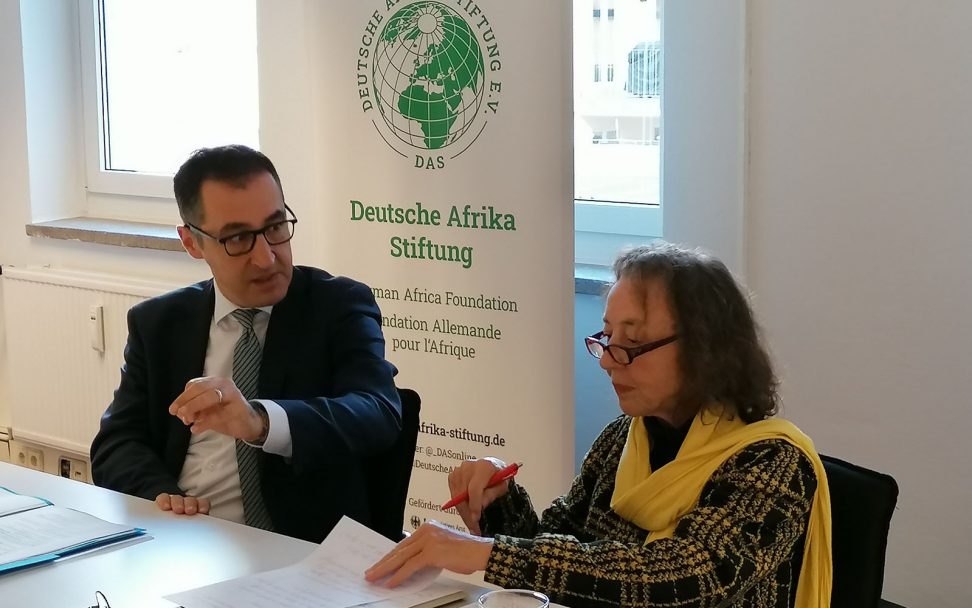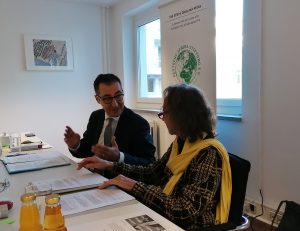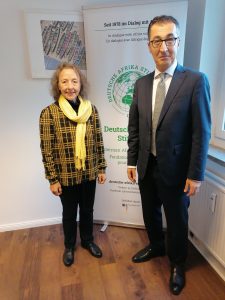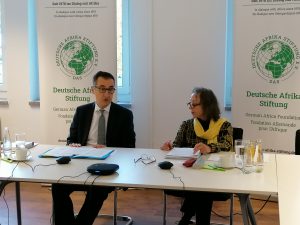Disrupted supply chains and rising food prices are leading to a further shortage of food worldwide in the wake of the Ukraine war, so that fears of a global hunger crisis are growing. Even the first successful shipments of wheat from Ukraine have so far brought little relief to markets. The unreliability of imports is threatening the food security of many countries – particularly on the African continent, whose own agriculture is also struggling in many places with the effects of climate change. For example, the Horn of Africa is currently experiencing the worst drought in 40 years due to climate change, and according to estimates by the Intergovernmental Authority on Development (IGAD), 50 million people are affected by an acute food crisis here alone.
Against this background, the German Africa Foundation invited Cem Özdemir MdB, Federal Minister of Food and Agriculture, to a discussion. Already at the G7 Conference of Agriculture Ministers in May 2022, Federal Minister Özdemir recognized the urgency of the issue of global food security as well as Germany’s social responsibility and clearly positioned himself in favor of a joint solution to agricultural problems and the anchoring of the human right to food in all policy processes. At the G7 summit in June, the leading industrialized nations also pledged an additional $4.5 billion to ensure global food security.
But what exactly has happened since then? Given the current situation, how can sustainable food systems and global supply chains be created to secure the world’s food supply in the long term? What measures has the Ministry of Food and Agriculture under the leadership of Federal Minister Özdemir taken so far? In particular, what does cooperation between Germany and its African partners in the agricultural sector look like in this regard?
These and other questions were the focus of the dialogue between Federal Minister Cem Özdemir and the President of the German Africa Foundation, Dr. Uschi Eid.
An article with the same title was subsequently published on the topic in the German magazine “Senate” of the Senat of Economy, issue 3/2022, December 2022 (translation by DAS):
Disrupted supply chains and rising food prices are leading to further food shortages worldwide in the wake of the Ukraine war, raising fears of a global hunger crisis. The unreliability of imports threatens the food security of many countries – especially on the African continent. According to the latest report ” Africa – Regional Overview of Food Security and Nutrition 2021″, published by the African Union Commission, the FAO (Food and Agriculture Organisation of the United Nations) and the UN Economic Commission for Africa, 281.6 million Africans suffered from hunger in 2020. This is 46.3 million more people than in 2019, but the distribution across the continent varies widely, with 44% of undernourished people living in the east of the continent, compared to only 2.4% in southern Africa. In addition to the acute challenges posed by the ongoing war, there are the increasingly noticeable effects of climate change, with which local agriculture is struggling. For example, the Horn of Africa is currently experiencing the worst drought in 40 years due to climate change, and the Intergovernmental Authority on Development (IGAD) estimates that 50 million people here alone are affected by an acute food crisis.
The drastically deteriorating situation of food security in the face of a multiple crisis situation was the reason for the German Africa Foundation to invite the Federal Minister of Food and Agriculture, Cem Özdemir MP, to a discussion. This dialogue on 11 October 2022 with the President of the German Africa Foundation, Dr Uschi Eid, was at the same time the start of the new series of events “DAS Thema aktuell”, an online breakfast format, which will take place in the future on given occasions.
Since the beginning of his term in office in December 2021, Federal Minister Cem Özdemir has made it clear that the right to adequate food is an issue close to his heart. The fulfilment of this human right goes hand in hand with the achievement of the goals of the 2030 Agenda. Here, the Federal Ministry of Food and Agriculture (BMEL) focuses particularly on the second Sustainable Development Goal (SDG 2), which includes ending hunger and promoting better nutrition and sustainable agriculture. The current crises in the world, including the aforementioned Ukraine war, the climate crisis, the loss of biodiversity, but also still the consequences of the Corona pandemic, pose enormous hurdles to achieving this goal.
Understandably, the Federal Minister’s efforts in 2022 initially focused on necessary and important immediate measures such as the creation of new export routes for food from Ukraine, especially to Africa. But Özdemir sees only short-term benefits even in the transport routes via land and rail, for which he has campaigned very hard with success. The first successful deliveries from Ukraine, mainly wheat, also to East Africa, brought only little relief and price reductions on the markets. To create global food security, reliability is needed. This can be achieved on the one hand through permanent diverse export corridors, but above all it requires sustainable and resilient agricultural and food systems. To establish such systems, the German government is not only relying on bilateral cooperation, but is increasingly seeking multinational approaches.
In May 2022, at the G7 Ministers of Agriculture Conference, which had not been held in this format for a long time and was reconvened by him, Federal Minister Özdemir clearly positioned himself in favour of a joint solution to the agricultural challenges. The communiqué of the G7 agriculture ministers reads in detail: Food exports are right and important as an immediate measure to improve the food situation, but they are not sustainable. For global food security, there is a need for a transforming agricultural systems in countries affected by hunger. As these are often countries particularly affected by global warming, the G7 Ministers of Agriculture discussed both measures to mitigate climate change and those to adapt agriculture to the changing conditions. “The fight against the climate crisis is a fight for food security,” said Federal Minister Cem Özdemir also in the discussion with Uschi Eid. Here, for example, the focus should be on the cultivation of climate-adapted, i.e. traditionally locally occurring, crops. In addition to technical aspects such as access to affordable seeds and fertilisers or the development of an infrastructure for more efficient supply and cooling chains to reduce post-harvest losses, for example, the focus was also on social aspects. Local actors and their needs need to be taken more into account and involved in order to make this change sustainable. Smallholder farmers need to be strengthened, and more attention needs to be paid to the role of women in agriculture and society. In addition, there are factors at the political level such as good governance and the fight against corruption.
This already abbreviated selection of factors and areas of influence shows that global food security cannot be successfully established by a Ministry of Food and Agriculture alone. It requires anchoring the human right to food in all policy areas. In Germany, for example, there is now an Inter-Ministerial Task Force, which includes not only the BMEL but also, for example, the Federal Ministry for Economic Cooperation and Development (BMZ) and the Federal Ministry of Finance. In addition, BMZ Minister Svenja Schulze, together with World Bank President David Malpass, proposed at the G7 Conference to establish an alliance for global food security. In addition to the World Bank, the G7 states and the EU Commission, the UN Global Crisis Response Group, the African Union, the UN World Food Programme and the International Fund for Agricultural Development (IFAD) are among the supporters.
The African Union (AU) itself declared 2022 the Year of Nutrition under the motto “Strengthening Resilience in Nutrition and Food Security on the African Continent”. It is therefore positive to note that the AU, as a mouthpiece for the interests of the various African countries, is increasingly involved in strategies to achieve global food security. The BMEL also wants to strengthen this cooperation, since the African continent is already the regional focus of bilateral cooperation. It sees the greatest development potential in agriculture there and would like to stand by its partners with financial resources and know-how to build a climate- and crisis-resilient agricultural system.
The President of the German Africa Foundation, Dr Uschi Eid, considers the aspect of knowledge transfer essential. Strong scientific cooperation between African countries and Germany is needed. However, and this was her urgent request for the further work of the Federal Minister, it is essential to listen to the African partners and to develop solution strategies together. In the past, she said, concepts had too often been developed – with the best of intentions – only to be submitted to the partners for fine-tuning or even just for approval. This approach is rarely accepted and is therefore not sustainable.



